Organisational Analysis: Paradigms and Assumptions in System Dev
VerifiedAdded on 2023/06/14
|27
|2337
|92
Report
AI Summary
This report provides an organizational analysis focusing on different paradigms in system development, drawing from Burrell and Morgan's classification. It discusses radical structuralism and functionalism, exploring knowledge assumptions, context conceptualization, and knowledge acquisition processes within each paradigm. The report delves into social relativism, its types, assumptions, and criticisms, contrasting it with functionalism's instrumental reasoning and objective approach. It further examines the advantages and disadvantages of each paradigm, touches upon rational research topics like alcohol use epidemiology, and addresses practical applications, such as workplace surveillance. The analysis emphasizes the importance of understanding these paradigms for effective system development and organizational analysis.

Organisational Analysis
Assignment 1
Name
Student ID
Assignment 1
Name
Student ID
Paraphrase This Document
Need a fresh take? Get an instant paraphrase of this document with our AI Paraphraser
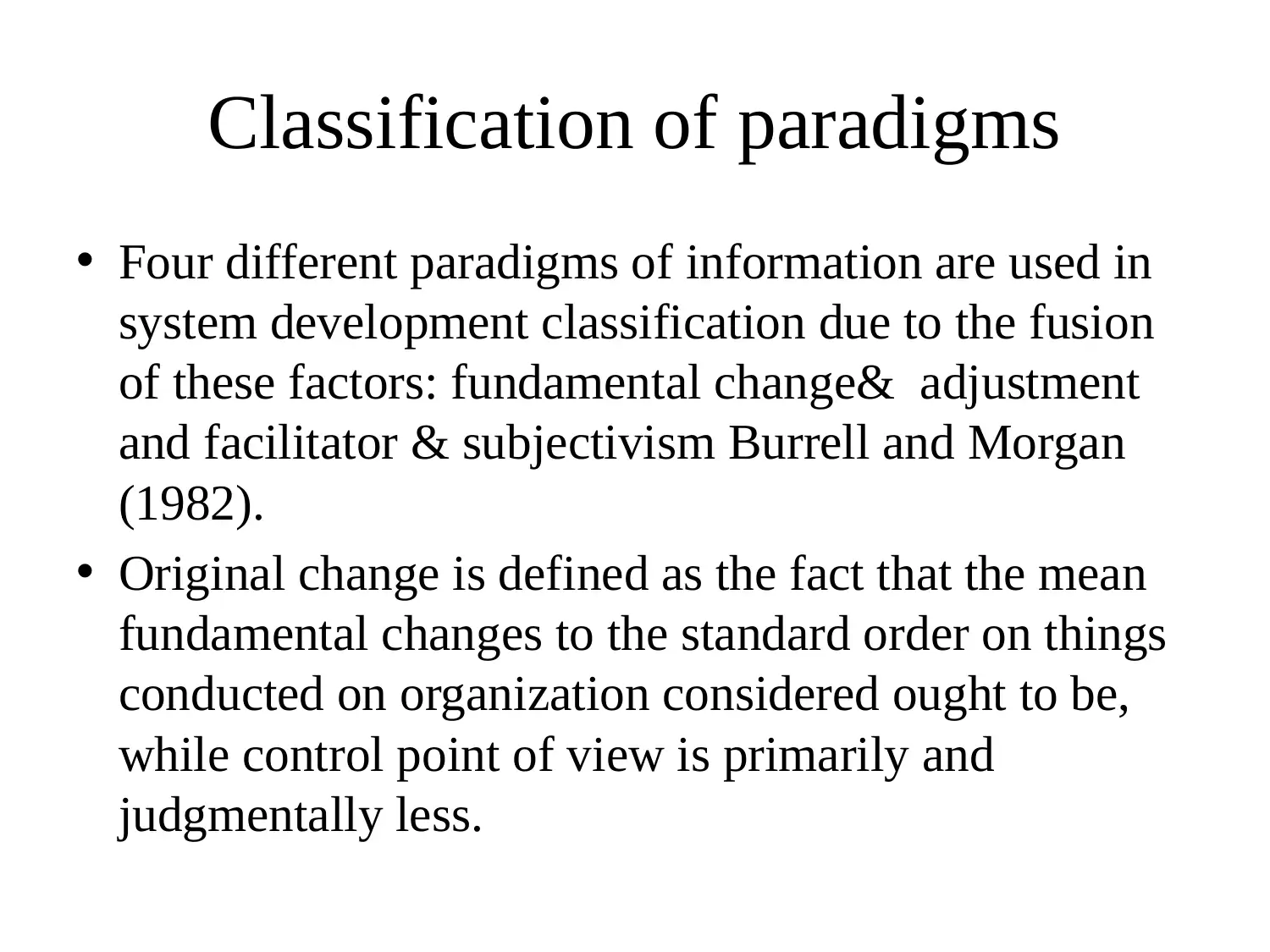
Classification of paradigms
• Four different paradigms of information are used in
system development classification due to the fusion
of these factors: fundamental change& adjustment
and facilitator & subjectivism Burrell and Morgan
(1982).
• Original change is defined as the fact that the mean
fundamental changes to the standard order on things
conducted on organization considered ought to be,
while control point of view is primarily and
judgmentally less.
• Four different paradigms of information are used in
system development classification due to the fusion
of these factors: fundamental change& adjustment
and facilitator & subjectivism Burrell and Morgan
(1982).
• Original change is defined as the fact that the mean
fundamental changes to the standard order on things
conducted on organization considered ought to be,
while control point of view is primarily and
judgmentally less.
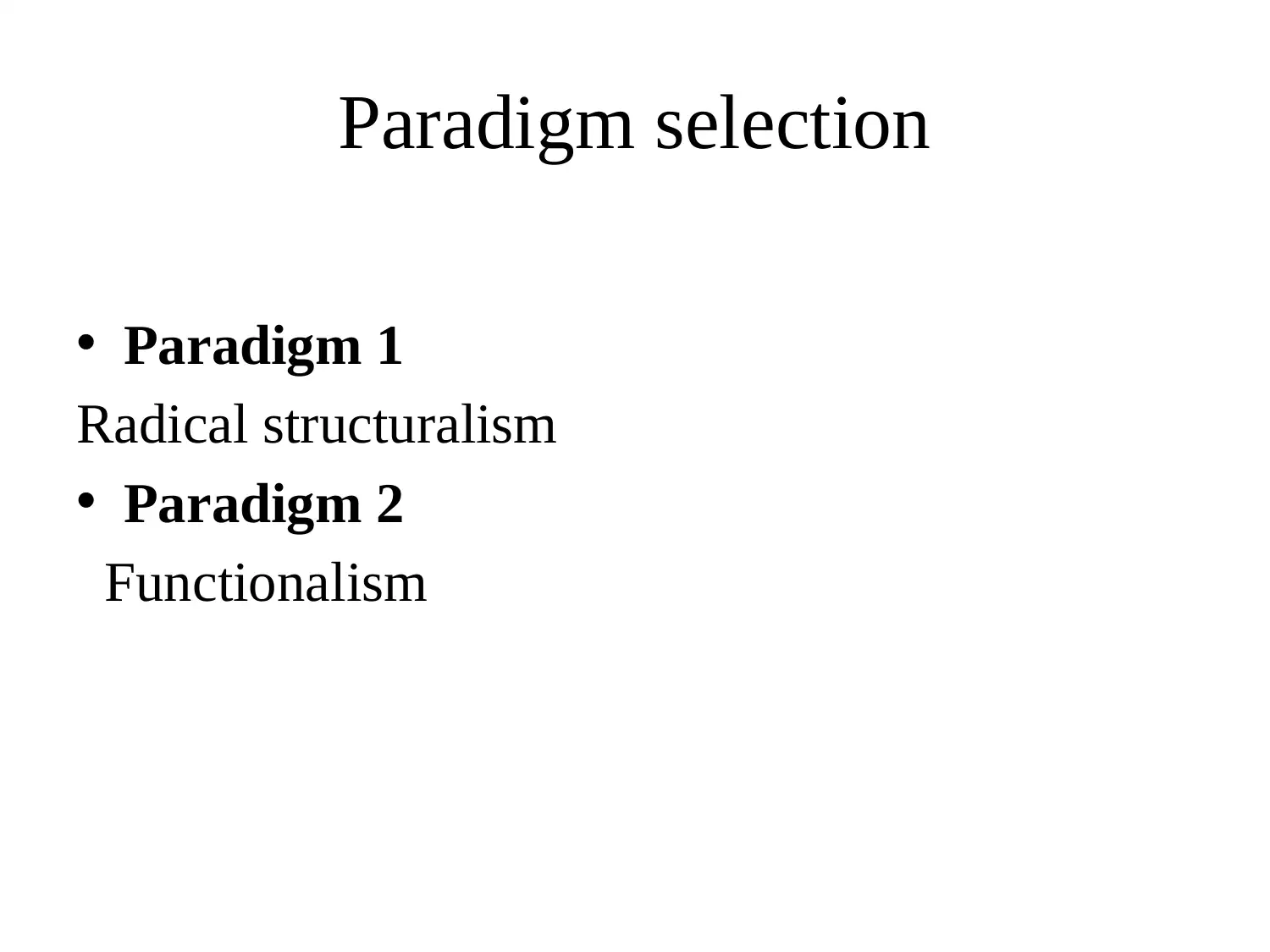
Paradigm selection
• Paradigm 1
Radical structuralism
• Paradigm 2
Functionalism
• Paradigm 1
Radical structuralism
• Paradigm 2
Functionalism
⊘ This is a preview!⊘
Do you want full access?
Subscribe today to unlock all pages.

Trusted by 1+ million students worldwide
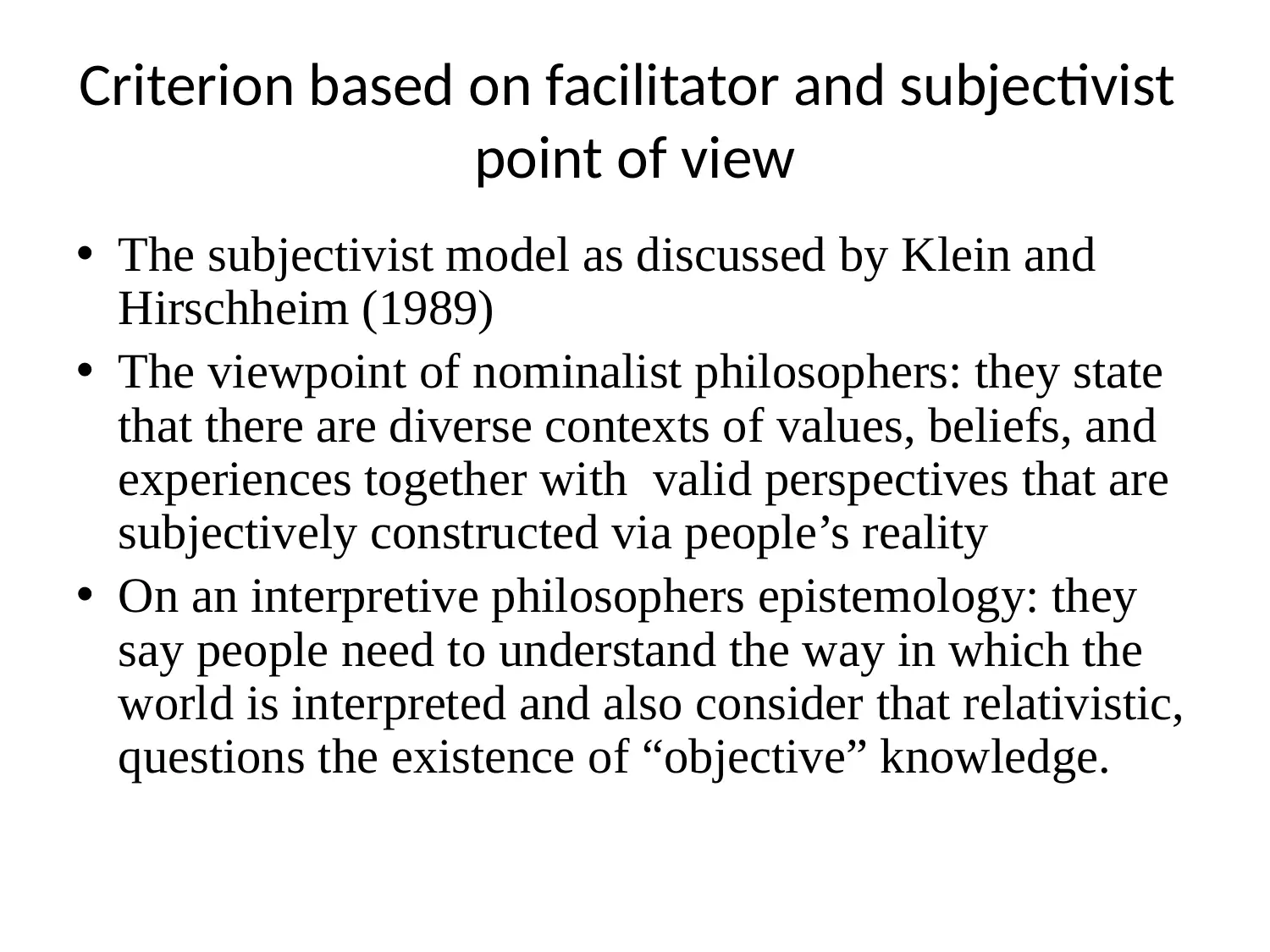
Criterion based on facilitator and subjectivist
point of view
• The subjectivist model as discussed by Klein and
Hirschheim (1989)
• The viewpoint of nominalist philosophers: they state
that there are diverse contexts of values, beliefs, and
experiences together with valid perspectives that are
subjectively constructed via people’s reality
• On an interpretive philosophers epistemology: they
say people need to understand the way in which the
world is interpreted and also consider that relativistic,
questions the existence of “objective” knowledge.
point of view
• The subjectivist model as discussed by Klein and
Hirschheim (1989)
• The viewpoint of nominalist philosophers: they state
that there are diverse contexts of values, beliefs, and
experiences together with valid perspectives that are
subjectively constructed via people’s reality
• On an interpretive philosophers epistemology: they
say people need to understand the way in which the
world is interpreted and also consider that relativistic,
questions the existence of “objective” knowledge.
Paraphrase This Document
Need a fresh take? Get an instant paraphrase of this document with our AI Paraphraser
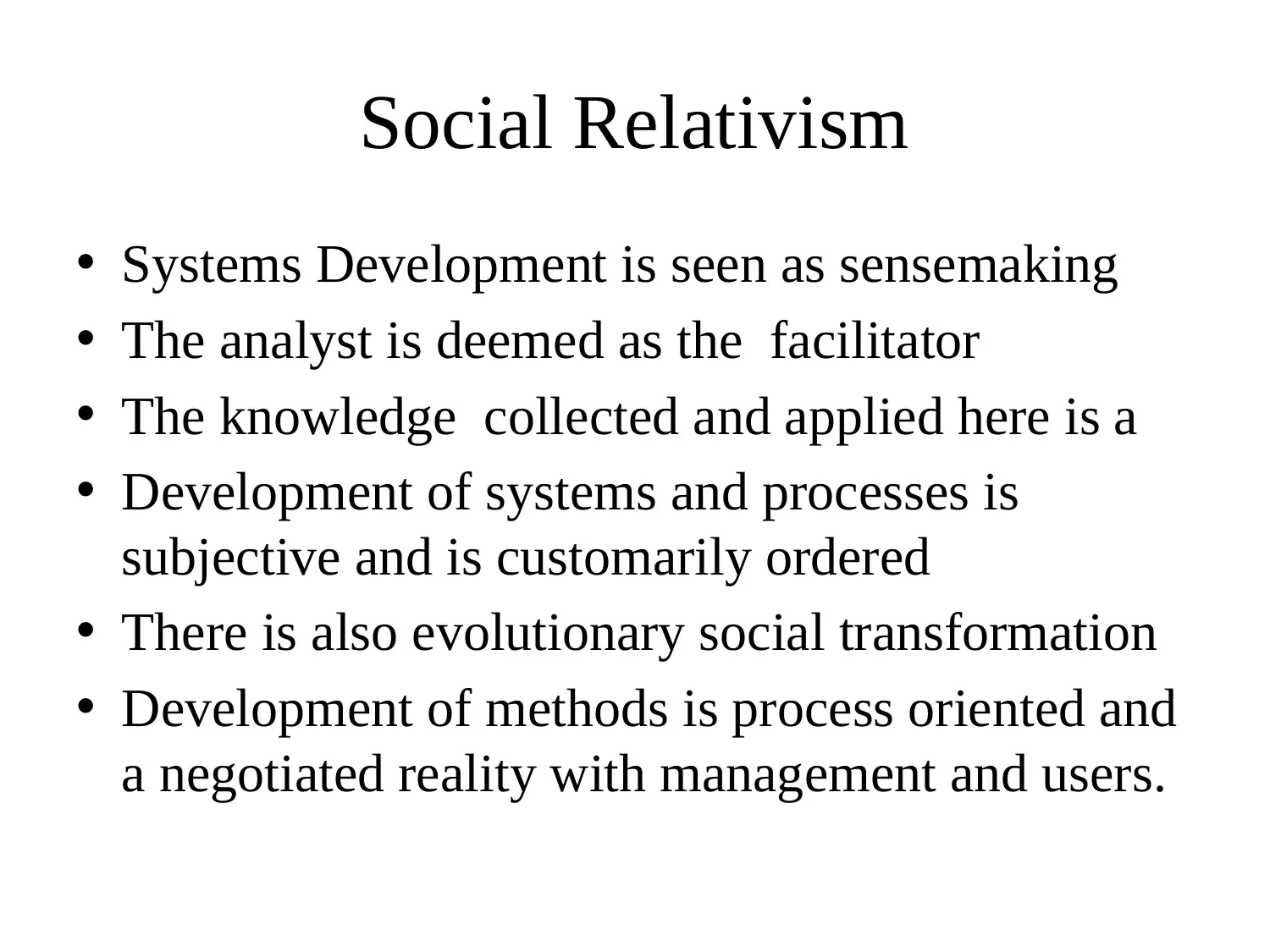
Social Relativism
• Systems Development is seen as sensemaking
• The analyst is deemed as the facilitator
• The knowledge collected and applied here is a
• Development of systems and processes is
subjective and is customarily ordered
• There is also evolutionary social transformation
• Development of methods is process oriented and
a negotiated reality with management and users.
• Systems Development is seen as sensemaking
• The analyst is deemed as the facilitator
• The knowledge collected and applied here is a
• Development of systems and processes is
subjective and is customarily ordered
• There is also evolutionary social transformation
• Development of methods is process oriented and
a negotiated reality with management and users.
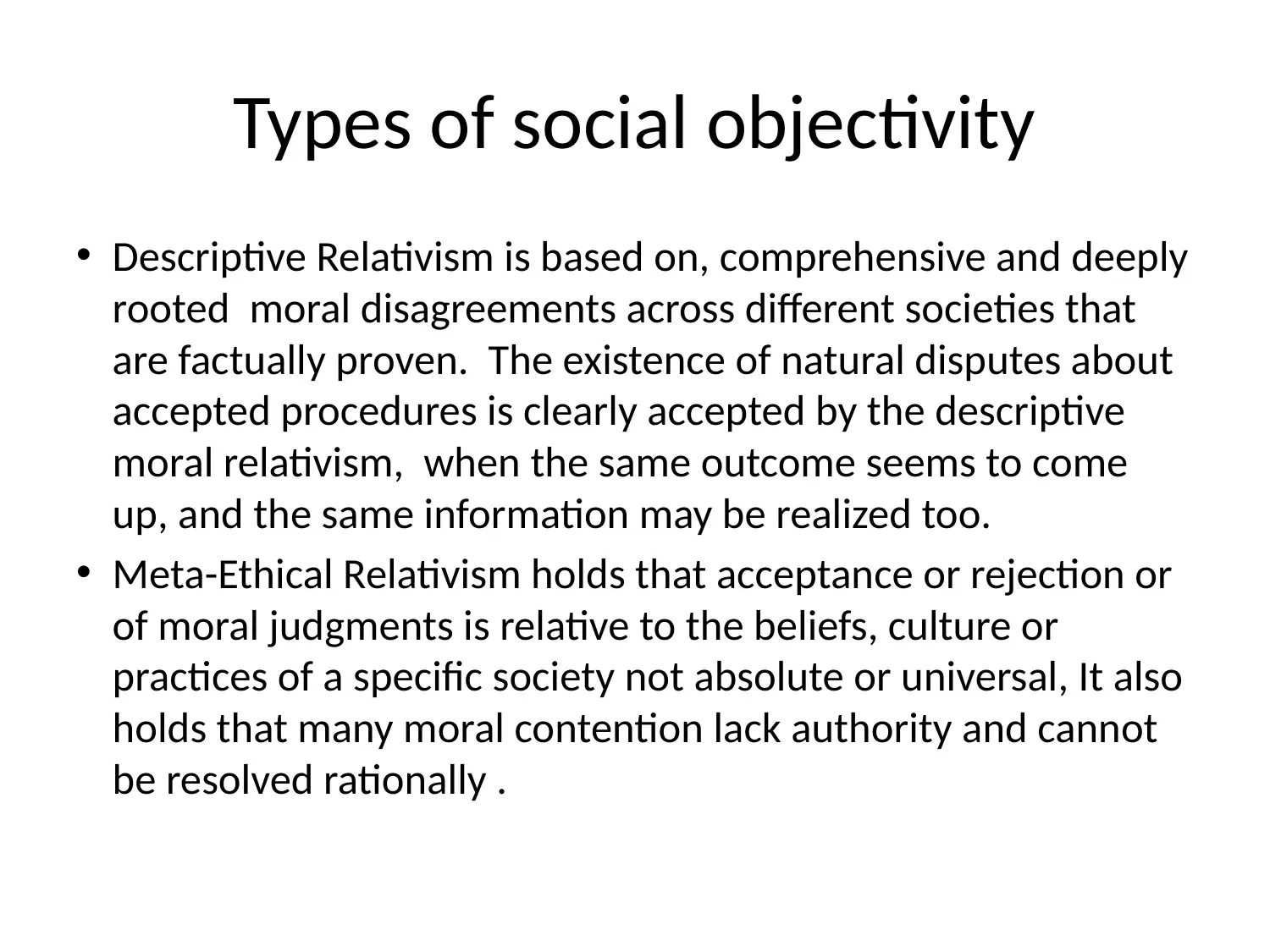
Types of social objectivity
• Descriptive Relativism is based on, comprehensive and deeply
rooted moral disagreements across different societies that
are factually proven. The existence of natural disputes about
accepted procedures is clearly accepted by the descriptive
moral relativism, when the same outcome seems to come
up, and the same information may be realized too.
• Meta-Ethical Relativism holds that acceptance or rejection or
of moral judgments is relative to the beliefs, culture or
practices of a specific society not absolute or universal, It also
holds that many moral contention lack authority and cannot
be resolved rationally .
• Descriptive Relativism is based on, comprehensive and deeply
rooted moral disagreements across different societies that
are factually proven. The existence of natural disputes about
accepted procedures is clearly accepted by the descriptive
moral relativism, when the same outcome seems to come
up, and the same information may be realized too.
• Meta-Ethical Relativism holds that acceptance or rejection or
of moral judgments is relative to the beliefs, culture or
practices of a specific society not absolute or universal, It also
holds that many moral contention lack authority and cannot
be resolved rationally .
⊘ This is a preview!⊘
Do you want full access?
Subscribe today to unlock all pages.

Trusted by 1+ million students worldwide
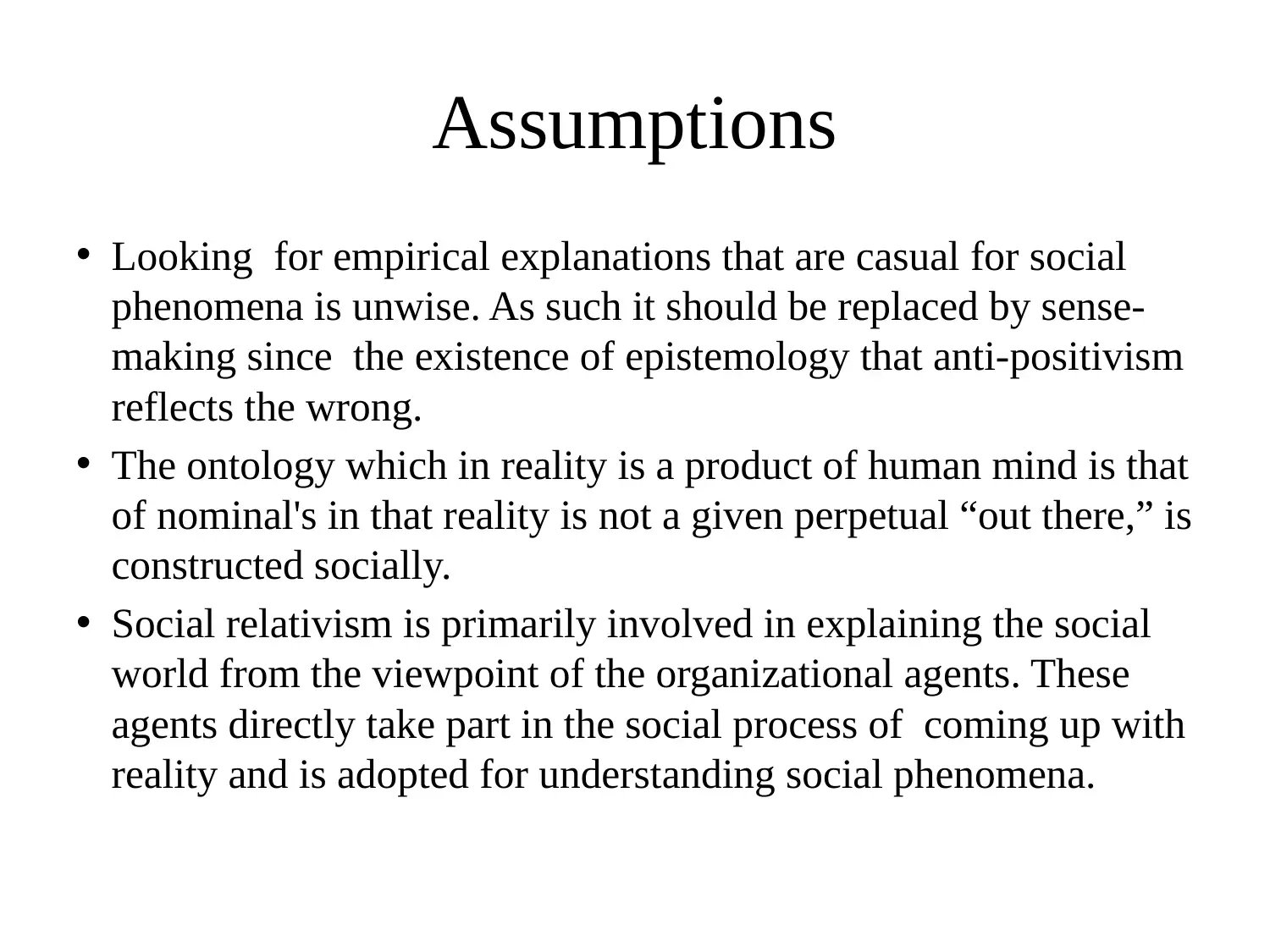
Assumptions
• Looking for empirical explanations that are casual for social
phenomena is unwise. As such it should be replaced by sense-
making since the existence of epistemology that anti-positivism
reflects the wrong.
• The ontology which in reality is a product of human mind is that
of nominal's in that reality is not a given perpetual “out there,” is
constructed socially.
• Social relativism is primarily involved in explaining the social
world from the viewpoint of the organizational agents. These
agents directly take part in the social process of coming up with
reality and is adopted for understanding social phenomena.
• Looking for empirical explanations that are casual for social
phenomena is unwise. As such it should be replaced by sense-
making since the existence of epistemology that anti-positivism
reflects the wrong.
• The ontology which in reality is a product of human mind is that
of nominal's in that reality is not a given perpetual “out there,” is
constructed socially.
• Social relativism is primarily involved in explaining the social
world from the viewpoint of the organizational agents. These
agents directly take part in the social process of coming up with
reality and is adopted for understanding social phenomena.
Paraphrase This Document
Need a fresh take? Get an instant paraphrase of this document with our AI Paraphraser
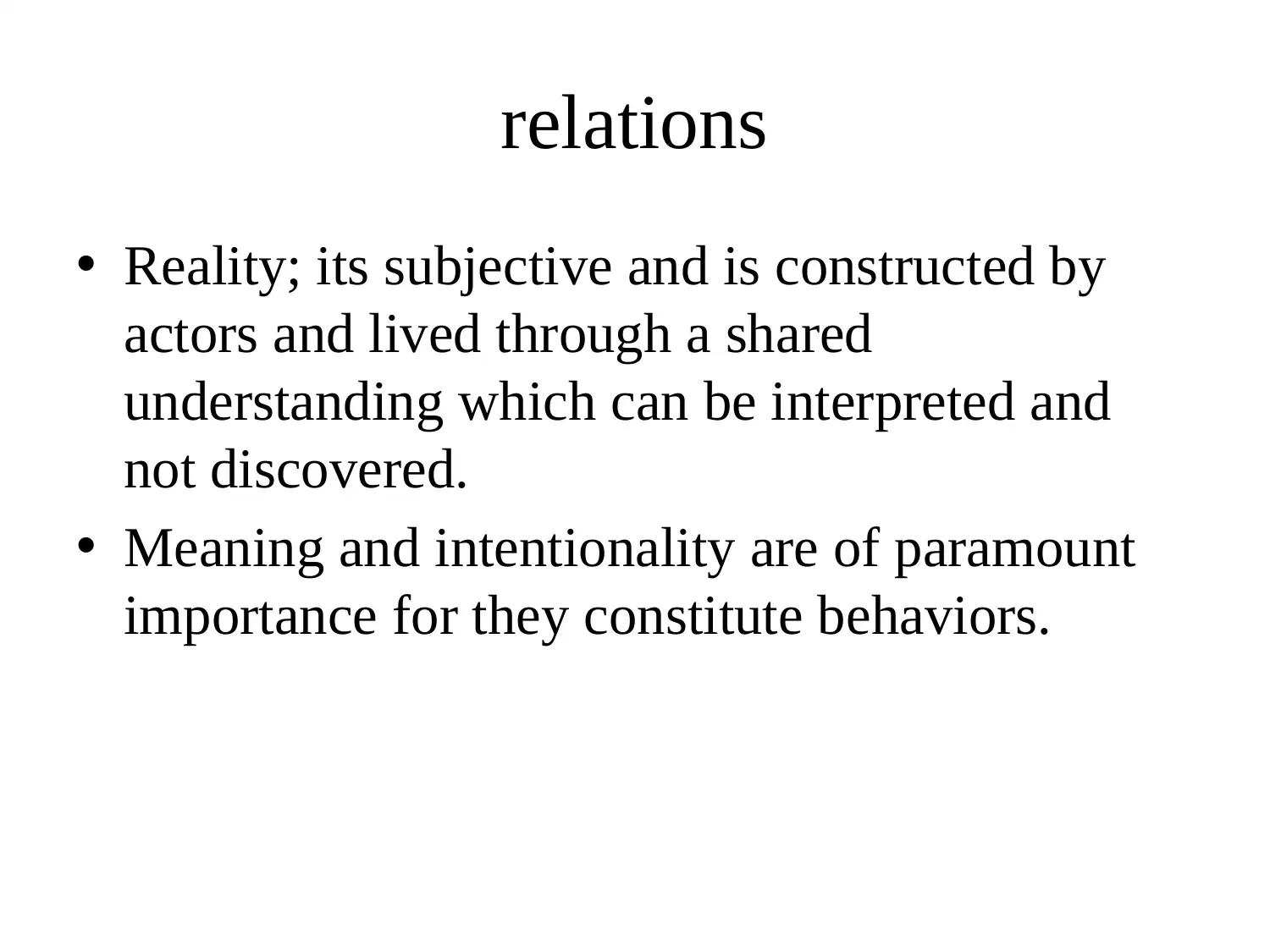
relations
• Reality; its subjective and is constructed by
actors and lived through a shared
understanding which can be interpreted and
not discovered.
• Meaning and intentionality are of paramount
importance for they constitute behaviors.
• Reality; its subjective and is constructed by
actors and lived through a shared
understanding which can be interpreted and
not discovered.
• Meaning and intentionality are of paramount
importance for they constitute behaviors.
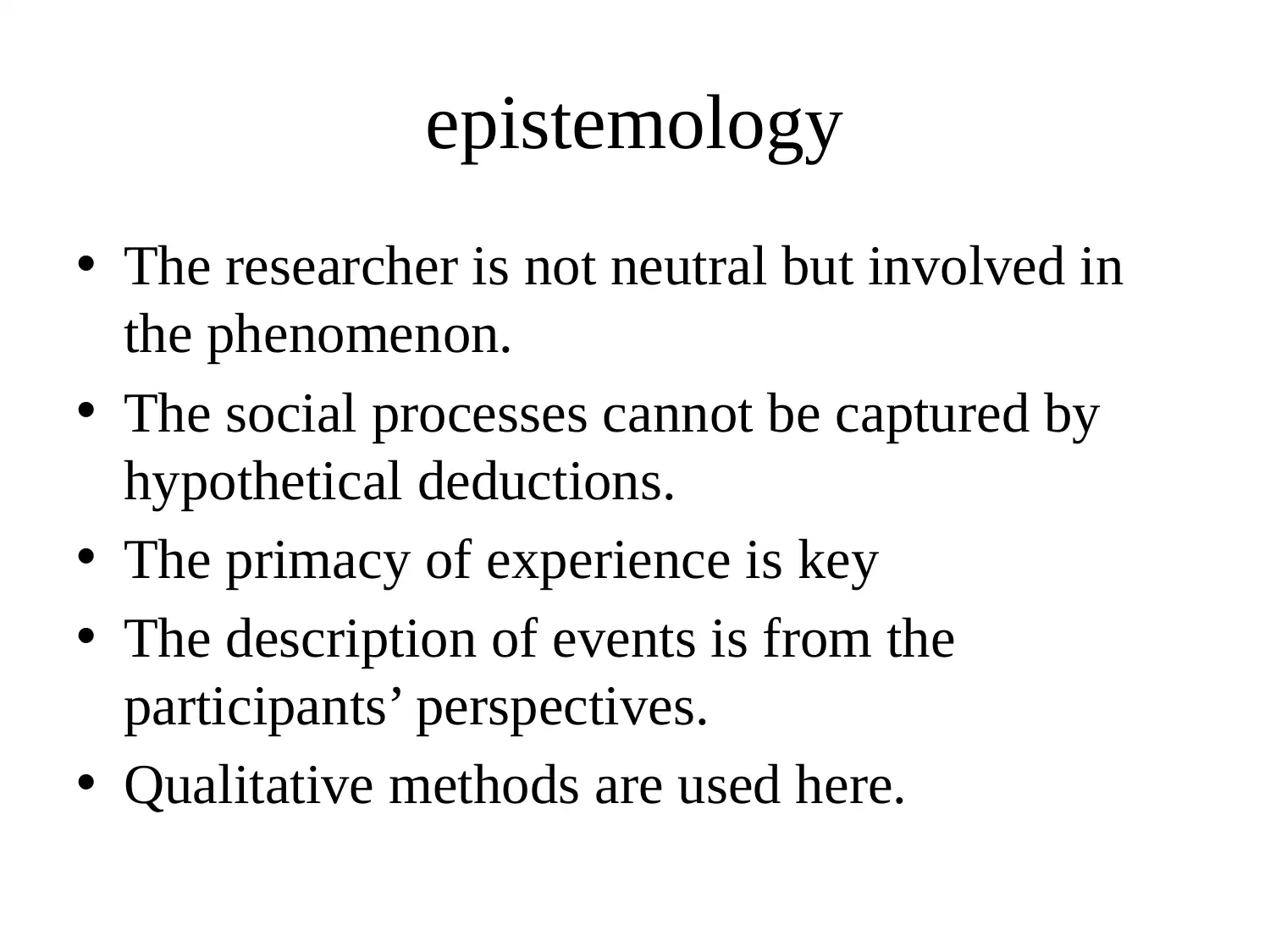
epistemology
• The researcher is not neutral but involved in
the phenomenon.
• The social processes cannot be captured by
hypothetical deductions.
• The primacy of experience is key
• The description of events is from the
participants’ perspectives.
• Qualitative methods are used here.
• The researcher is not neutral but involved in
the phenomenon.
• The social processes cannot be captured by
hypothetical deductions.
• The primacy of experience is key
• The description of events is from the
participants’ perspectives.
• Qualitative methods are used here.
⊘ This is a preview!⊘
Do you want full access?
Subscribe today to unlock all pages.

Trusted by 1+ million students worldwide
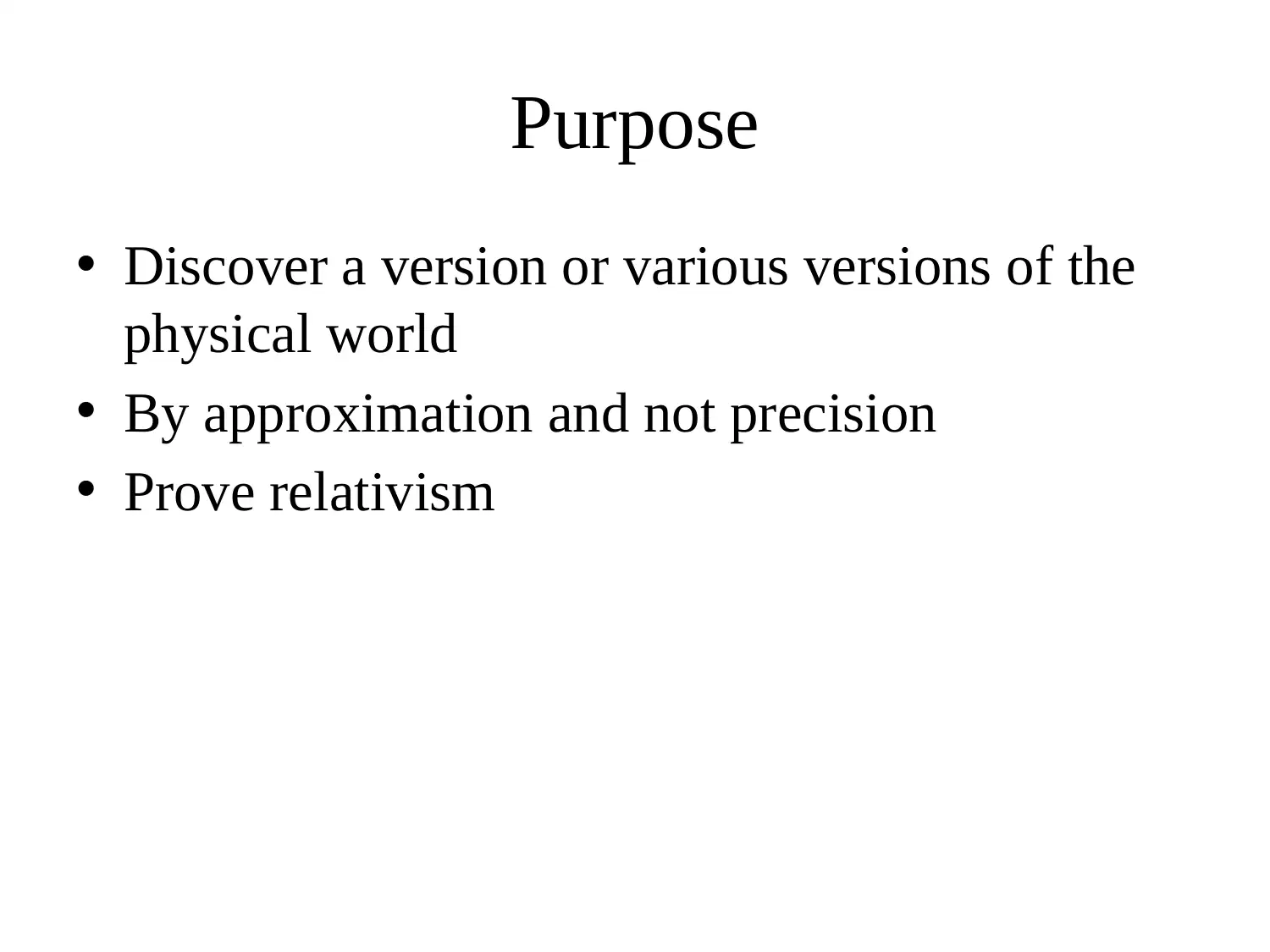
Purpose
• Discover a version or various versions of the
physical world
• By approximation and not precision
• Prove relativism
• Discover a version or various versions of the
physical world
• By approximation and not precision
• Prove relativism
Paraphrase This Document
Need a fresh take? Get an instant paraphrase of this document with our AI Paraphraser
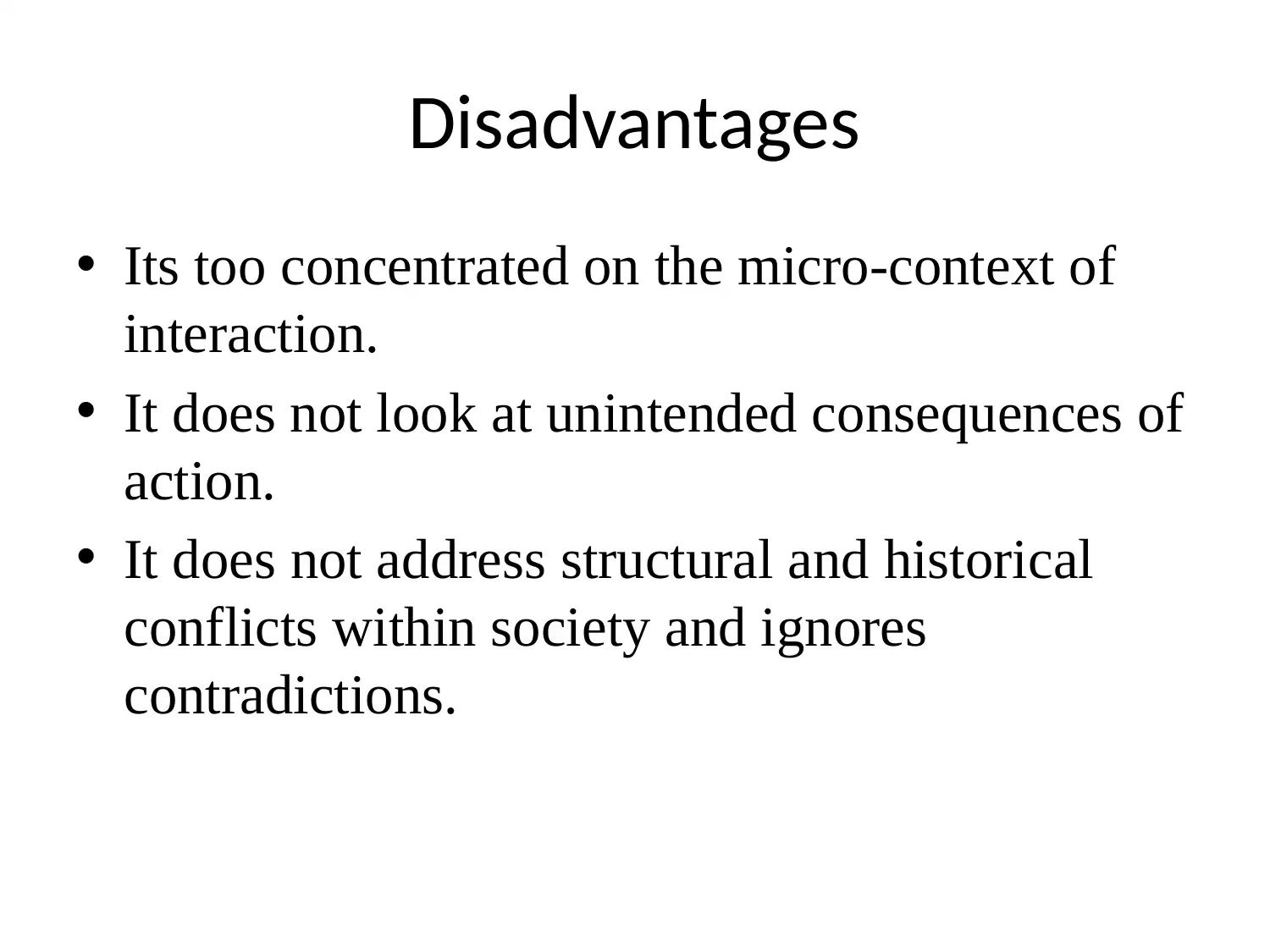
Disadvantages
• Its too concentrated on the micro-context of
interaction.
• It does not look at unintended consequences of
action.
• It does not address structural and historical
conflicts within society and ignores
contradictions.
• Its too concentrated on the micro-context of
interaction.
• It does not look at unintended consequences of
action.
• It does not address structural and historical
conflicts within society and ignores
contradictions.
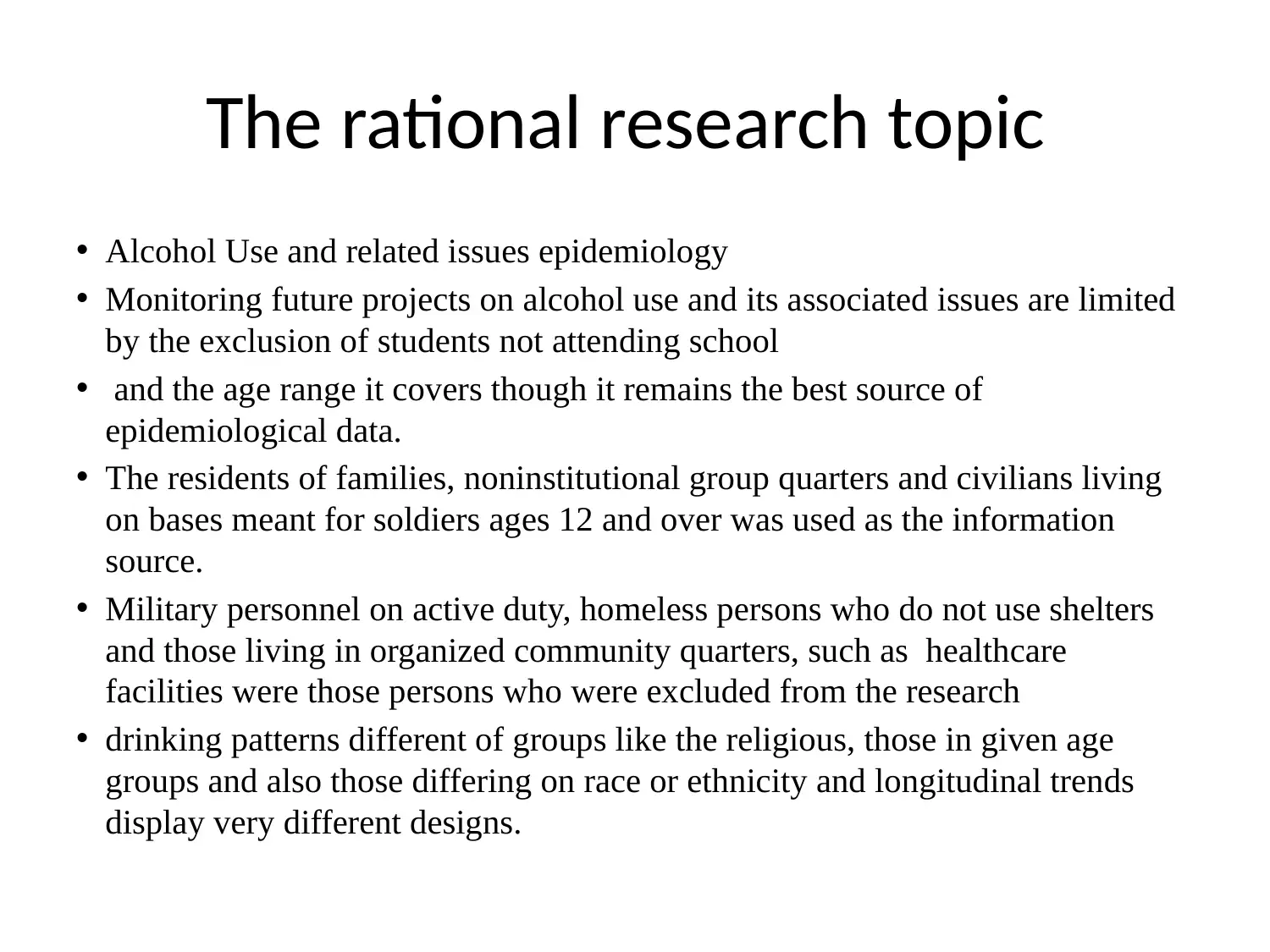
The rational research topic
• Alcohol Use and related issues epidemiology
• Monitoring future projects on alcohol use and its associated issues are limited
by the exclusion of students not attending school
• and the age range it covers though it remains the best source of
epidemiological data.
• The residents of families, noninstitutional group quarters and civilians living
on bases meant for soldiers ages 12 and over was used as the information
source.
• Military personnel on active duty, homeless persons who do not use shelters
and those living in organized community quarters, such as healthcare
facilities were those persons who were excluded from the research
• drinking patterns different of groups like the religious, those in given age
groups and also those differing on race or ethnicity and longitudinal trends
display very different designs.
• Alcohol Use and related issues epidemiology
• Monitoring future projects on alcohol use and its associated issues are limited
by the exclusion of students not attending school
• and the age range it covers though it remains the best source of
epidemiological data.
• The residents of families, noninstitutional group quarters and civilians living
on bases meant for soldiers ages 12 and over was used as the information
source.
• Military personnel on active duty, homeless persons who do not use shelters
and those living in organized community quarters, such as healthcare
facilities were those persons who were excluded from the research
• drinking patterns different of groups like the religious, those in given age
groups and also those differing on race or ethnicity and longitudinal trends
display very different designs.
⊘ This is a preview!⊘
Do you want full access?
Subscribe today to unlock all pages.

Trusted by 1+ million students worldwide
1 out of 27
Your All-in-One AI-Powered Toolkit for Academic Success.
+13062052269
info@desklib.com
Available 24*7 on WhatsApp / Email
![[object Object]](/_next/static/media/star-bottom.7253800d.svg)
Unlock your academic potential
Copyright © 2020–2026 A2Z Services. All Rights Reserved. Developed and managed by ZUCOL.